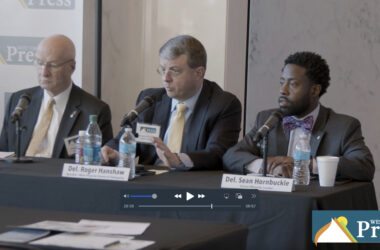ELKINS, W.Va. — Members of the city’s business community learned about a local man who nearly lost everything because of drug addiction Monday during the Elkins Rotary Club’s weekly meeting.
Petersburg resident Rajan B. Masih, MD, took Rotarians through the story of his fall from grace – how the illegal abuse of prescription pain medications turned his previously successful life upside down before he managed to kick the habit and was prosecuted for his crimes by the federal government.
Local attorney and Elkins Rotarian Stephen Jory, who served as Masih’s legal counsel through the judicial process, introduced Masih during the meeting.
“Drug dependency of so many in our community is why we now lock our doors and install security systems where we never thought about such things in the past,” he said. “Today I want to introduce you to someone who used to be part of the problem. Now he is part of the solution.”
Masih was born in Chicago, the son of a physician. He was educated in both India and the United States. After attaining his medical degree he began practicing as an emergency medicine physician in El Paso, where he lived from 1993 to 2000. In El Paso, Masih met his wife, who was a police officer, and the two now have five children. Masih is board certified in emergency medicine, internal medicine and critical care and has worked at Grant Memorial Hospital, Davis Memorial Hospital and Saint Francis Hospital.
The family relocated to Petersburg in 2000 and Masih began practicing medicine in the region. The doctor, who had developed an interest in racing Indy lights cars, was in a “bad” accident in 2005 on the track at Watkins Glen that caused significant injury to his back.
“For the very first time in my life, I took samples of Hydrocodone from the sample closet – things that I knew had been there for years but had never tried myself,” he said. “It was the very first time I tried Hyrdrocodone and instantly I loved it.”
Masih said the drug made him feel pain-free, euphoric, energetic and talkative.
“From this one-time sample I started taking it again and again and again,” he said. “I got to a point where I went through all of the samples that St. Francis Hospital emergency department had.”
At this point, the doctor began writing illegal prescriptions filled in with the names of his wife, mother, children and even his brother, who was also practicing medicine in the region. Masih began keeping a diary to ensure he wasn’t prescribing in a manner that would raise red flags.
“My addiction to prescription medicine was full blown by 2006,” he said. “In 2007 I required 7.5 pills of Hydrocodone every four hours just to prevent myself from going into withdrawal. My whole life became one absolute vicious cycle.”
As a medical professional, Masih said he was aware of the dangerous health effects that taking acetaminophen, which is an active ingredient in many prescription medications, can have on the liver. To offset these concerns he began to steal from local emergency rooms the drug Mucomyst, which is orally administered to patients with Tylenol overdoses. The doctor also began secretly performing ultrasounds on his liver to ensure he wasn’t showing signs of liver toxicity.
All the while, Masih continued to practice medicine, regularly staying for long shifts in the emergency room. One day his wife found a bottle of pills and he promised her that it wouldn’t happen again. Fifteen days later it happened again and then again.
“One day she found me with a bottle of prescription pills and had a very difficult time waking me up,” he said. “She yelled at me and threatened to leave me.”
With the support of his family Masih took measures to quit his habit for the first time in 2007.
“We made a plan that I would self-detox,” he said. “I didn’t want anybody to know and I was afraid of losing my medical license. I could have easily gone to any rehab anywhere in the country but I decided I was smart enough to do this myself.”
The couple took a week off from work and rented a cabin at Cheat Lake Resort so the doctor could kick his habit. It seemed to work, but Masih said that within an hour of coming home he had found pills and ingested them. Upon being discovered, he agreed to quit cold turkey.
“Mercifully, while all of this was going on, in the background a pharmacist had informed the DEA about a bad doctor,” he said.
On Aug. 29, 2009, a Drug Enforcement Agency raid team arrested Masih at his office. He was prosecuted in Elkins under 136 federal charges, one of which was for allegedly causing death to a patient as a result of a drug he had prescribed – an offense carrying a mandatory minimum sentence of 20 years behind bars.
“In the process of my own addiction, I recklessly wrote prescriptions all the time,” he said. “As a result of my actions many people became addicted to opioids in my community. People even overdosed and died from these prescriptions. An entire community was definitely devastated because of my actions.”
Jory challenged all 136 of the charges, effectively reducing Masih’s sentence to 48 months in federal prison. Masih spent 34 months in a medium/high security facility at FCI Gilmer and was released on house arrest in July, 2014. After spending six months on home confinement, Masih is currently serving federal probation.
“I’ve now been clean and sober for over seven years,” he said. “I’ve seen the absolute devastation that my actions, and other physicians that prescribe narcotics recklessly, have caused in this state and across the country.”
Masih said he believes that whereas he was extremely addicted to narcotics, he was also very addicted to seeing patients in the midst of his condition.
“I believed that seeing patients was, for me, a form of self-esteem boosting or self-validation,” he said. “In many ways the way I practiced medicine made me feel like a rock-star.”
According to the National Institute of Health, eight out of 100 people who are exposed to an opiate will become addicted, although Masih said he believes the actual figures are even higher. In 2013, according to the data prepared by the DEA, 1,959 MDs were arrested, 3,622 nurses were arrested and 654 pharmacists were arrested as a result of prescription drug addiction.
“There need to be more avenues for help,” he said. “I was very afraid of losing everything and I believe there needs to be more open dialogue and a safe harbor created for healthcare providers to be able to seek the help that they need in a timely manner before they cause more devastation in their own lives and in their communities.”
Masih noted that in prison he did significant amounts of research on the prescription drug problem. He quickly learned that most people in prison for drugs are in for the crime of diversion, which is defined by the National Society of Drug Diversion Investigators as any criminal or illegal use of a prescription drug.
Masih was given permission from the Federal Bureau of Prisons to do a study on inmates incarcerated for drug diversion. His findings, which offer inside perspective and highlight many of the ways addicts are able to continue abusing drugs and operate illegal operations without discovery, are published in the Journal of Addiction Medicine.
According to data collected by the Center for Disease Control, more than 40,000 people died nationwide in 2013 from the overdose of prescription drugs, a figure that does not include cases where pills were involved but other narcotics were also found to play a part. According to the same data, West Virginia ranks first in the country in the number of prescription drug deaths.
Before closing, Masih noted several mitigating techniques he believes can help reduce diversion. These include a “paradigm shift” in the way opioid narcotics are prescribed by examining the exposure/dose relationship; the implementation of a biometric scanning system – patented by Masih – that is designed to enhance state prescription monitoring programs by using retina scan and thumbprint instead of name and birth date; further measures taken towards effective pill identification during pill counts; and the implementation of gas chromatography/mass spectrometry drug tests, which test for individual drugs, along with the exact amount of chemicals in the blood stream.
Since his release, Masih has served as a keynote speaker at various arrangements and seminars to warn people about the dangers of prescription drug diversion. He has written two textbooks, titled “Prescription Drug Diversion & Risk Mitigation in Opioid Prescribing” and “Substance Abuse in Correctional Settings.”




